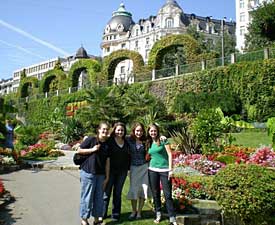 |
JYA
Journal—Notes From Abroad
By Britni Steingard ‘09

Britni Steingard ’09 (left) poses next to fellow
JYA students Melanie Jaskolka ’09, Nina Krek (Northwestern
University ’09), and Olivia Marshall ’09 at a park
in Lausanne, Switzerland. |
JYA
Journal with:
|
I have studied French
language, literature and culture since age 6, thanks to
my hometown’s French immersion program.
But I am not a French major. I am a biology major with a
minor in environmental science and policy (if I can complete
all the requirements).
I had thought about a
double major—bio and French—but
ES&P is just too important. You see, I am a budding conservationist.
For as long as I can remember, I have been a firm believer
that by conserving our environment, we help ourselves.
One
of the first things I learned at Smith was that anyone involved
in conservation or sustainable development must have
familiarity with the natural sciences, the social sciences,
and the economic sciences. No sustainable development plan
will come to fruition if scientists, community leaders, and
economists—the stakeholders—cannot work together.
We must all be able to speak the same lingo. And for a conservation
biologist to have any sway in the environmental debate, she
needs to work with the people in power to “save” the
planet—namely, politicians and businesspeople. I knew
that to become the biologist I want to be, I would need to
learn to speak their language in case they couldn’t
speak mine.
As a science major with aspirations to be a conservation
biologist, I was hesitant to go abroad for a whole year,
but the JYA Geneva program presented a unique opportunity.
Not only would I have a chance to finally prove to myself
that I am fluent in French, but where better to learn political
lingo than the international hub of Geneva, Switzerland?
Former home of the League of Nations and home to the Graduate
Institute of International Studies, several branches of the
UN, and hundreds of NGOs. I was certain I would find an environmental
policy course or internship I could stomach. With any luck,
I would not only return from Geneva fluent in French, but
also conversational in politics and economics.
Switching from the natural sciences to political science
and economics was a strange and difficult transition for
me, but it was well worth the effort. I found four environmental
policy courses at two different institutions, two of which
were taught in French. “Économie du Développement
Durable” (“Economy of Sustainable Development”)
at the University of Geneva Faculty of Social Sciences and
Economics, and “Interdisciplinary Seminar on Environmental
Issues,” “Managing the Global Commons,” and “Politiques
Agricoles pour un Exploitation Soutenable des Ressources
Renouvelables” (“Agricultural Policy for
the Sustainable Exploitation of Renewable Resources”)
at the Graduate Institute of International Studies and Development.
Having no background in
economics or political science, I had to dive right in
and hope I could swim. You could say I started another
immersion program. So far, I’ve managed
fairly well. And having so many government majors in the
Geneva program has been a big bonus.
A Smith connection at the International Labor Organization
helped me find an internship involving the impact on employment
of sustainable development. Since January, I have been researching
the impact of green jobs and eco-industries on the job market
in developing countries. I not only get to learn about the
hypothesis that green living is good living, but also get
to be a part of proving it at a prestigious international
organization.
As the year draws to a
close and I prepare to return to the United States, I can’t say that I’m fluent
in political lingo, and I’m not sure I ever will be.
But at least I know that when the time comes, I’ll
be able to hold my own in the environment debate—in
both English and French.
|
 |























